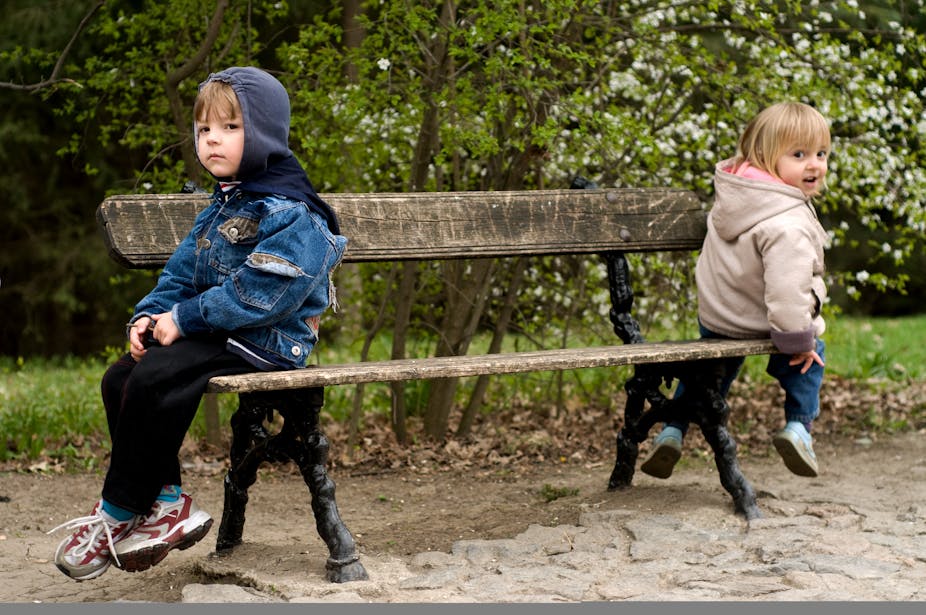In order to protect children from harm, the state has the power to separate children from their parents. In exceptional cases it is sometimes necessary to separate siblings – to protect them from harm or ensure their individual needs are met.
Yet a freedom of information (FOI) request by Action for Children shows one in three siblings are separated when they enter foster care. The charity received information from 89% of UK local authorities about placements in the 2013 financial year. They found that 3,598 of 11,082 children from sibling groups were separated. In the East Midlands region, the rate was 45%.
The statistics show, then, that if you enter care with your brothers and sisters there’s a very good chance you will be placed apart with different foster carers. Action for Children’s figures confirm the results of a survey from the Children’s Rights Director for England (now the Children’s Commissioner) who found that in their sample of 6,590 children, 62% of them had siblings who were also in care, and of these sibling groups 78% were living separately.
The importance of sibling contact
In the UK, the state’s involvement in foster care began during World War II when nearly 3m people, mostly children, were evacuated from cities to other homes in more rural areas to avoid the threat of bombing. The evacuation paid little attention to the bonds children had with their families, there was little to no contact with parents and sibling groups were often separated. Some young people were mistreated and abused by the families they were placed with.
The Cambridge Evacuation Survey in 1941 reported how for some children it was a traumatising experience and made two key recommendations: that greater attention should be paid to the emotional needs of the children, and that children should have contact with their parents and be placed with their brothers and sisters. More than 70 years later, the state is still separating siblings.
Research tells us how important sibling relationships are. They are the longest relationships we have. Of course they can, at times, be fractious – like all relationships, but they have an enduring importance, because they are linked to the formation of our identity and can provide us with a sense of belonging. The late Olive Stevenson, one of the most influential social work academics of recent times, said in a lecture at Oxford: “Time and time again children and later adults have shown us with frightening urgency that they must seek out their origins.” Despite abuse and neglect, which children and young people may experience in their birth families, a sense of belonging to them endures.
Seminal texts in the family placement literature reinforce the importance of family bonds and argue that wherever possible contact should continue. A growing number of international research studies have also specifically explored the experiences of sibling groups in public care and overwhelmingly reinforce the importance and the benefits of sibling relationships. One study in 2005 found that children placed separately from their siblings faced a significantly greater chance of their foster placement being disrupted.
This is about money not care
It has long been the case that there has been a shortage of foster carers and of course this impacts on available sibling placements. However, in a response to the findings of the FOI, the British Association of Social Work (BASW) gives another likely explanation as to why these separations are happening so frequently. BASW suggests that the belief system of austerity is unduly influencing how decisions are made about placements.
The mixed economy of care means resources are shared across the voluntary, independent and statutory sector. So up and down the country, people can foster for agencies from all of these sectors. Essentially, it is run as a market economy in which local authorities who are unable to recruit enough carers of their own look to the voluntary and independent agencies to plug the gaps. This is also the case for the provision of residential care for children and young people. This form of market provision is championed by all the main political parties.
However, despite their faith in these markets they don’t seem so keen on paying market prices. As BASW highlights, although placements for sibling groups are limited in their availability, they do exist – yet those making decisions about placements are unable to use them because of financial constraints.
Local authorities not only restrict the use of external agencies, a decision that is based on costs rather than needs – but this is also compounded by overstretched fostering teams who are unable to process applications from people who may have capacity to foster sibling groups quickly enough. It seems resources are driving and justifying the choices to separate siblings, when what we have known for a very long time is that for the most vulnerable children, we should be focused on their needs and making every effort to keep them with their brothers and sisters.
The principle is also still enshrined in legislation: Section 23 of the Children Act (1989) states that wherever possible siblings should be placed together. However, all of this only tells us what most people on the street would have a tacit understanding of: that it is important to keep brothers and sisters together.
The FOI findings show us that our public care system, which is intended to protect some of the most vulnerable children in the country, still fails to truly understand this.

